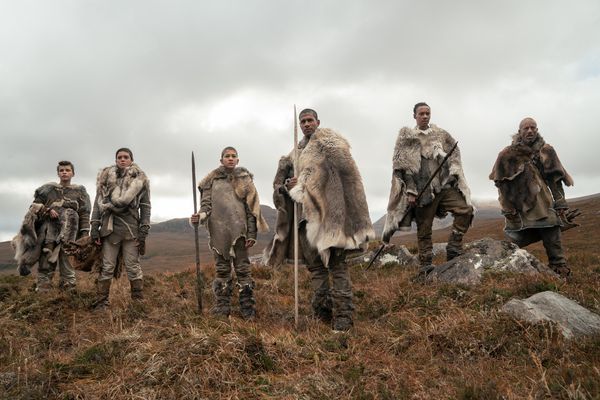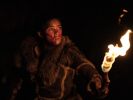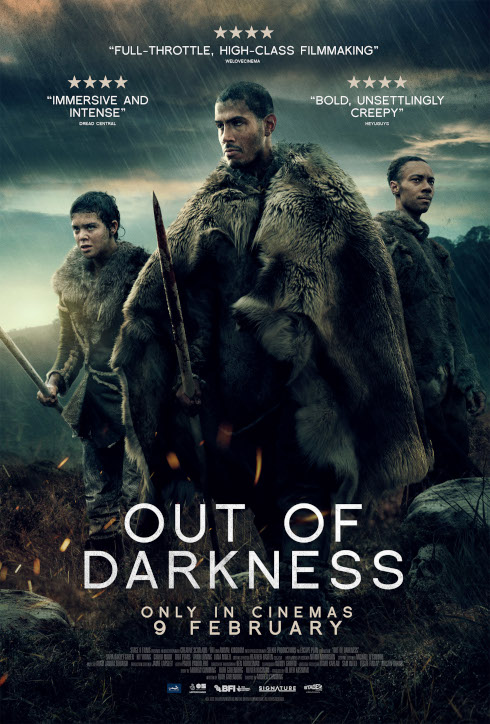Eye For Film >> Movies >> Out Of Darkness (2022) Film Review
Out Of Darkness
Reviewed by: Jennie Kermode

It has been said that everybody thinks they’re more intelligent than their parents. Carry that logic back a few generations and it’s hard to understand how the enlightenment happened when today’s scientists are hard pressed to convince people that the Earth is round. That said, we tend to have a seriously low opinion of our cave-dwelling ancestors, assuming that they were stupid, communicated in grunts and hunted by hitting things with clubs. In fact, we’ve had sophisticated language for thousands of years and before we learned how to smelt metals we had to be a lot more innovative to get by using just the materials that were available to us.
Andrew Cumming’s Out Of Darkness (which changed its title from The Origin, presumably to avoid confusion with Ava DuVernay’s recent work) endeavours to set the record straight. It follows a group of people who have recently arrived in a strange land, following their urgent search for food and shelter, exploring the tensions between them, and watching what happens when they encounter something monstrous in the dark. There are terrors at work here which pre-date the Neolithic period by a long way and are every bit as real today. Cummings brings them all to bear as we stumble through the night with only guttering flames to guide us, straining to catch the tiniest sound that might give us a hint of what’s out there.

This is not an era in which anyone can realistically hope to survive alone. There are six of them in the group, with hints that they were part of a much larger band before they were forced into exile. Adem (Chuku Modu) is the leader, the biggest and the strongest, carrying a pale, finely etched spear. His brother Geirr (Kit Young) carries a darker spear which seems to signify his lower status. Ave (Iola Evans) is carrying Adem’s child in her belly, and his young teenage son Heron (Luna Mwezi) is his pride and joy. Also travelling with them are Odal (Arno Lüning), an old man valuable for his wisdom, and Beyah (Safia Oakley-Green), whom they refer to as a stray, a wanderer whom they have taken in. She has developed a tentative romance with Geirr, who tells her she is “one of us now,” but from time to time others remind her that, lacking a formal role, she is “for whatever we need,” and as tensions rise, that becomes a very uncomfortable situation.
Beyond the thriller elements, Cummings challenges ideas about the early development of homo sapiens which were widely accepted as fact just a few decades ago, addressing popular assumptions about race and gender along the way. It’s mostly well founded, so that the occasional unlikely choice becomes easy to accept as particular to this group, within which there is a well established sense of culture and tradition expressed in passing with little recourse to exposition. The evidence suggests that few Neolithic peoples actually lived in caves, but it’s easy to understand why this group, cold and tired and ill-equipped to defend itself, might seek one out. Forests were generally a good place to find food and shelter, but one can understand why an unfamiliar forest might be something they’d want to steer clear of.
Shooting in Wester Ross, Cummings is unable to fully recreate an ancient forest environment but does his best with what he’s got, and most viewers won’t know the difference. The costuming, by Janna Bannon and Sally Marchant, is particularly good: practical, believable, and capable of telling us a lot about the characters and the technologies available to them. Whilst the plot is slender, its emotional significance for the characters is not a small thing, and Oakley-Green, in particular, carries it well. That said, it’s the fear you’ll remember – and all the more so because of the underlying awareness that people lived with such fears, one way or another, for thousands of years, otherwise we would not be here.
Reviewed on: 17 Feb 2024

















